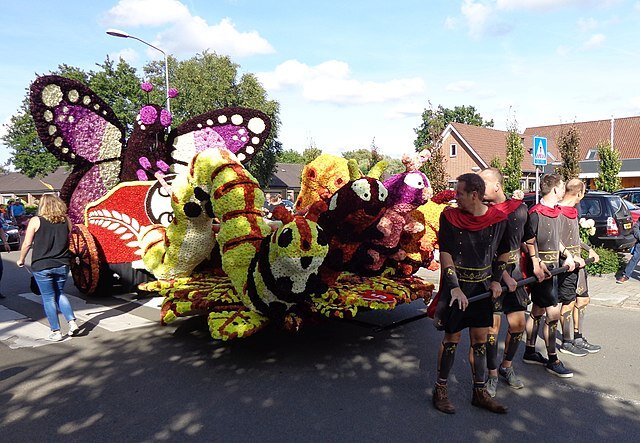Spring! A time of birth, renewal, and life. The ancient Romans celebrated the dawning of spring in April and early May by honoring Flora, the goddess of spring during the Florifertum celebration.
Flora represents fertility, renewal of life, and the flowering of Spring. Her blessing is a gift to the Earth, protecting the spring blooms, and breathing life into the world.
The festival of Floria begins on April 28th and traditionally ends after six days of festivities. It is a time of revelry and merriment, where people celebrate as they give praise to the goddess of spring.
History of Floralia
Flora is one of the fifteen deities that had a state-supported priest, known as a flamen. The flamen was an elevated position in Roman society.
The Temple of Flora was built in 238 BCE near the Circus Maximus, a large arena for public games and gladiator battles.
In addition, a smaller temple was built outside the city gates which was believed to be used more for worship.
Landscape with the Floralia. Andrea Locatelli @ 1741
Floralia and Beltane
Many experts consider Floria the precursor to the May Day of the British Isles. We modern-pagans continue to evoke the essence of Flora and her protection of the Spring in our Beltane celebrations.
Ancient Romans would host bonfires at night to celebrate the light that comes with the goddess Flora, just as the Celts did during Beltane. Many of the traditions of Beltane commemorate the Celtic goddess Belenus, for renewal and fertility.
The Maypole
The vibrant colors and dance of the Maypole evoke the celebrations of Ancient Rome in the name of Flora. As we pagans dance around the pole, we can call on the goddess of Spring to share in our dance like the Ancient Romans did.
How Do Modern Pagans Celebrate Floralia?
To participate in Floria was to become part of a thriving, energetic celebration. Floria was not a time for a solemn ceremony.
Like our own springtime revelries, Floria was full of dancing, feasting, games, and ceremonies honoring Flora.
Animals such as rabbits, deer, and goats were honored and as symbols of fertility.
Dancing
There’s a reason so many modern Pagan celebrations involve dancing - our predecessors loved to celebrate their gods and goddesses with dance as much as we do!
The ancient revelers of Floria would spend much of their celebration dancing. Dance was and is important to Floria celebrations, so much so that ancient depictions of the goddess frequently show her dancing in nature.
The Drums and Dances
Flora comes to drive away from the darkness of winter. We can celebrate her overcoming the darkness and bringing us Spring by dancing and playing the drums to drive out the darkness with her, just as the Ancient Romans did.
Family Connections
Have your children make instruments, or simply provide young children with pots and pans to bang on. Tambourines, drums, and flutes are all good instruments for expressing joy.
Bring your instruments outside and make a joyful noise!
Floralia Parade Bloemencorso Floralia te Voorthuizen 15-9-2018. Photo by Henkv D
Playing Games
The Ancient Romans loved any chance to host a competition. Games were held, including feats of sportsmanship. They also enjoyed reciting poetry, and theatrical performances.
The games at Floria were different than other Roman games because plebians and the poor could participate. Women could also participate in the plays and games, making Floria a holiday where women had more rights than normal.
Prostitutes and slaves were allowed to attend and join in the fun. Dancing naked was encouraged.
Wearing Flower Wreaths
With a name like Floria, we know flowers are an important symbol for this goddess. She welcomes the flowers of spring.
We continue to celebrate Flora during Beltane when we wear our flower garlands. May flowers are especially associated with Flora and wearing them celebrates the goddess.
Weave flowers together to make garlands.
Flower Symbolism
Dandelions – enhances dreams and prophetic powers
Gardenia – peace and healing
Honeysuckle – strengthens memory, helps let go of the past
Hyacinth – love and protection
Jasmine – good for dream work, raises self-esteem and good fortune
Lavender – purifying, sweet dreams and relaxation
Lily of the valley – peace and harmony
Marigolds – enhance vision work
Rose – love and peace
Sweet pea – friendship and courage
Read my blog 110 MAGICAL FLOWERS AND HOW TO USE THEM
The May Queen
The tradition of electing a May Queen hails back to the ancient Floria traditions. The May Queen symbolizes renewal and the coming of spring and connects the ancient goddess of Flora, the queen of the Spring, with our modern May Day festivities.
Well Dressings
Many modern pagans give thanks to Flora by dressing the wells of their town with floral arrangements. Flora’s blessing protects the water supply and brings good weather for spring blooms and celebrating at the wells is one way to ask for her blessing.
Visiting Shrines and Festivals
We can commemorate Flora whenever we travel to one of her shrines or temples. To this day, Flora continues to have statues and celebrations held in her name.
We find Flora’s beautiful face depicting many statues and paintings in Rome and Spain, where her ancient celebrations were once held. The Capitoline Museums of Rome keep some of her ancient statues, Boticelli, Rembrandt, and Titian have painted her into immortality.
Floralia celebrated with a theater performance at the archeological site of the Roman city in Gorsium near Tác in Hungary. Photo by Terezia Maria
The Celebratory Outfit
During Floria, the Ancient Romans put away their white togas and wore colorful clothing that evoked the image of Spring.
Celebrate Flora by wearing her colors: the yellows, greens, pinks, purples, and blues of blooming flowers!
Throw Beans
The scattering of legumes was a common practice at ceremonies such as weddings and the birth of a child.
Beans symbolize fertility and good luck. During the Floralia festivities, garbanzo beans were often thrown at the crowds.
Family Connections
Plant beans in your garden or in a pot. Green beans such as Provider are easy to grow.
The Ceremonial Release of Hares
Hares (rabbits) are symbols of spring and fertility in many pantheons. Like the Ancient Romans, we pagans can enjoy our pet rabbits and goats and appreciate them as symbols of springs fertility.
Family Connections
Give thanks for flowers and gardens and the wild animals you share your abundance with.
Leave an offering for the wild rabbits in your area. A field or a park along a brushy area is a good location. Some fresh greens such as kale or Swiss chard as well as carrots make a nice gift.
Hosting the Floria Games
One of the best and honestly, the most fun, ways to celebrate the goddess Flora is to host games in her honor. The Romans did this with wrestling, racing, archery, javelin tossing, and other Olympic-esque games.
Not a sporty person? Host a theatrical rendition of plays about spring, or read your poetry about the goddess and her celebration.
Take Away
No matter how you choose to celebrate Spring, remember that we are evoking a goddess of fertility and renewal. Our celebrations should be full of life and fun, but also a deep respect for this important and ancient goddess.
Floria holds a great level of significance in modern pagan celebrations. We continue the legacy of the Ancient Romans in our May Day festivals, in our prayers to the goddess Flora, and in our reverence for the Earth.







